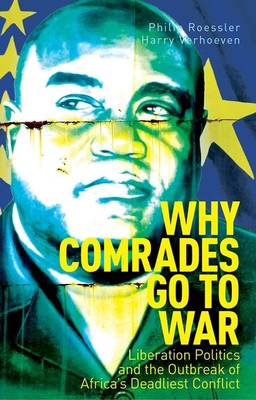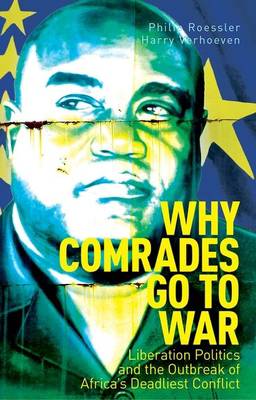
En raison d'une grêve chez bpost, votre commande pourrait être retardée. Vous avez besoin d’un livre rapidement ? Nos magasins vous accueillent à bras ouverts !
- Retrait gratuit dans votre magasin Club
- 7.000.000 titres dans notre catalogue
- Payer en toute sécurité
- Toujours un magasin près de chez vous
En raison de la grêve chez bpost, votre commande pourrait être retardée. Vous avez besoin d’un livre rapidement ? Nos magasins vous accueillent à bras ouverts !
- Retrait gratuit dans votre magasin Club
- 7.000.0000 titres dans notre catalogue
- Payer en toute sécurité
- Toujours un magasin près de chez vous
Why Comrades Go to War
Liberation Politics and the Outbreak of Africa's Deadliest Conflict
Philip Roessler, Harry Verhoeven
Livre relié | Anglais
60,45 €
+ 120 points
Format
Description
In October 1996, a motley crew of ageing Marxists and unemployed youth coalesced to revolt against Mobutu Seso Seko, president of Zaire/Congo since 1965. Backed by a Rwanda-led regional coalition that drew support from Asmara to Luanda, the rebels of the AFDL marched over 1500 kilometers in seven months to crush the dictatorship. To the Congolese rebels and their Pan-Africanist allies, the vanquishing of the Mobutu regime represented nothing short of a 'second independence' for Congo and Central Africa as a whole and the dawning of a new regional order of peace and security. Within fifteen months, however, Central Africa's 'liberation peace' would collapse, triggering a cataclysmic fratricide between the heroes of the war against Mobutu and igniting the deadliest conflict since World War II. Uniquely drawing on hundreds of interviews with protagonists from Congo, Rwanda, Angola, Uganda, Tanzania, Ethiopia, Eritrea, South Africa, Belgium, France, the UK and the US, Why Comrades Go To War offers a novel theoretical and empirical account of Africa's Great War. It argues that the seeds of Africa's Great War were sown in the revolutionary struggle against Mobutu-the way the revolution came together, the way it was organized, and, paradoxically, the very way it succeeded. In particular, the book argues that the overthrow of Mobutu proved a Pyrrhic victory because the protagonists ignored the philosophy of Julius Nyerere, the father of Africa's liberation movements: they put the gun before the unglamorous but essential task of building the domestic and regional political institutions and organizational structures necessary to consolidate peace after revolution.
Spécifications
Parties prenantes
- Auteur(s) :
- Editeur:
Contenu
- Nombre de pages :
- 512
- Langue:
- Anglais
Caractéristiques
- EAN:
- 9780190611354
- Date de parution :
- 28-02-17
- Format:
- Livre relié
- Format numérique:
- Genaaid
- Dimensions :
- 150 mm x 218 mm
- Poids :
- 725 g

Les avis
Nous publions uniquement les avis qui respectent les conditions requises. Consultez nos conditions pour les avis.






